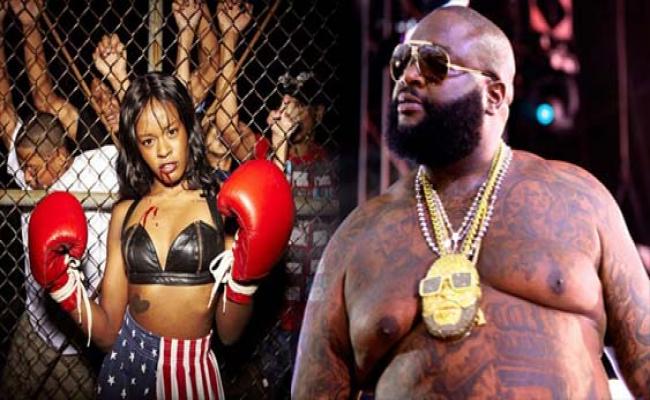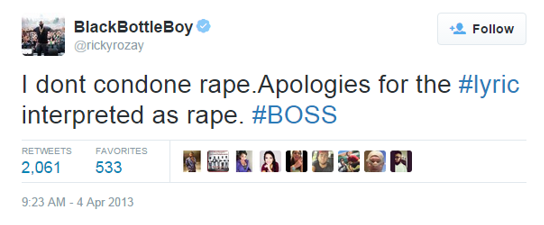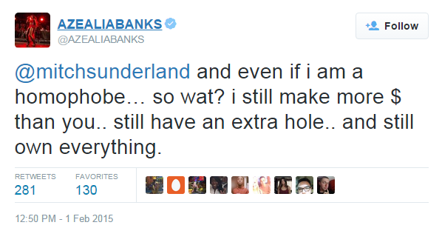|
Written by Sieya Sims Hip hop stars embroiled in a controversy are often forgiven by their fans— that is, if they’re male. Male rappers can make a slew of mistakes and continue to dominate the charts, whereas female rappers can make one mistake and lose all chances of success. This blog is a critical take on the gendered perceptions of hip hop stars and success, from the nineties to today, and it brings to light some theories on how fans choose who “deserves" to be forgiven. Some musicians are forgiven quickly for mistakes they’ve made, and some never make it back to the top. As a genre, hip-hop holds a fascinating place in fan forgiveness because “realness” is simultaneously celebrated with splendor, excess, and fantasy. We don’t typically hold these artists to the same standards that we hold the bubblegum pop star. Rappers aren’t expected to be perfect because the content of their music does not portray them as world-class citizens, and it isn’t meant to. But sometimes, when they do slip up in real life, we don’t give second chances. Unfortunately, when a female rapper is involved in controversy, fans are usually not so forgiving, showing that gangsta-ness outside of lyrics spoken may only be a trait admired in male rappers. Male rappers can make a slew of mistakes and continue to dominate the charts, whereas female rappers can make one mistake and lose all chances of success. Perhaps some people don’t think female rappers belong in the game in the first place. The mere fact that we refer to them as “female rappers” rather than just “rappers” is one of many examples for how there is not an equal playing field for both sexes in hip hop, including in fan forgiveness. One example of a male rapper being forgiven by fans lies in famous rapper Rick Ross. In 2013, Ross was featured on a song dubbed "UOENO" by fellow rapper Rocko. "UOENO" escalated to number 20 on the Billboard Hot 100 in the United States. It was Rocko’s biggest song to date, arguably due to Rick Ross’ feature. In spite of the debatably catchy name, there’s one detail about this chart-topping hit that you should be aware of if you’re not already: in this song, Rick Ross condones date rape. Ross raps, “Put Molly all in her champagne/ She ain't even know it/ I took her home and I enjoyed that/ She ain't even know it." Now, I’m not the only one who thought this lyric was pause-worthy. In fact, over 72,000 people petitioned to Reebok encouraging them to drop Ross’ sponsorship deal as a result of his comments in this song. Rick Ross did end up releasing an apology in response, albeit half-assed. See below: In response to this episode, Reebok dropped Ross, Rocko dropped the verse from the song for more radio play, and the song was still a success. Within a year, Ross released an album and has had a bounty of successful albums, singles, and features since then. Fans still purchased his music and went to his shows and there was an overall minimal reaction to the incident. Perhaps this is because his music is just “so catchy” in some fans’ eyes, but despite all of this Rick Ross was forgiven and the controversy is just a minor blip on his track record. And how can we discuss fan forgiveness without mentioning Chris Brown, one of the most successful artists in history? Brown has been an international superstar since the age of 15. He has been nominated for 15 Grammy’s, 43 BET awards, and 15 MTV VMAs. Right now, his net worth is estimated to be around $30 million. In 2009, Brown had an altercation with then-girlfriend Rihanna that led to them missing the Grammy’s— and a photo of Rihanna’s grotesquely beaten face was leaked and circulated on the news and the Internet. Since then, Brown has had a profusion of legal trouble, innumerable public feuds, assaults, and unfortunate homophobic lash-outs. Granted, Brown may have always been this type of person, but his exposure as a woman-beater brought his negative personality traits to light for the public to see. Despite this, he still leads the charts. Andy Kellman of Allmusic admits, "A fairly substantial backlash resulted in Brown's songs being pulled from rotation on several radio stations. Ultimately, however, it had little bearing on the progress of his music and acting careers." There was never a time when I felt the impact of Chris Brown’s lack of presence on the radio and on television, despite the fact that I knew he had done many horrible things. What is even more unsettling about what happened is that there were an abundance of female fans that seemed to be turned on by the incident, by publicly declaring that they would “let Chris Brown beat them any day” and “they don’t know why Rihanna complained.” The fact that Rihanna was ridiculed at all in the situation is a problem, but some fans went past forgiving Chris Brown’s abusive antics—they condoned it. They romanticized a relationship with him despite his abusive behavior because he is rich, sings love songs, and is good looking, proving males can get away with much more than females with fans. Now it’s 2015, Chris Brown has since gotten back together with, broken up with, and maybe gotten back together again with Rihanna. He now has a daughter named Royalty that he professes his love for daily on Instagram. It seems like the public is accepting 26-year-old Brown as a reformed good guy who rules the industry (and makes millions of dollars a year) despite his mishaps. In August of 2015, a biopic was released detailing the come-up and break-up of seminal rap group NWA titled Straight Outta Compton. One of the producers of the film and former members of the group depicted is Dr. Dre. A few days after the release of the movie an article called, “Here’s What’s Missing From Straight Outta Compton: Me and the Other Women Dr. Dre Beat Up” emerged. Dee Barnes, a former rapper and television host, wrote the article. Barnes details the aftermath of a TV segment about Dr. Dre that led him to become so upset that he viciously attacked her. Barnes describes his assaults on multiple other women as well. What’s shocking about this is that Dr. Dre doesn’t even debate his unsettling behavior. In 1991, Dr. Dre owned up to his actions in a Rolling Stone interview by asserting “It ain’t no big thing – I just threw her through a door.” Dr. Dre’s success continues despite there being public knowledge that he battered women. Today, he is the richest man in hip-hop, with a net worth of nearly a billion dollars due to Apple’s acquisition of his headphone line Beats by Dre. After Barnes released her article, Dre issued an apology to the women that he’s hurt. Life went on for Dre. Apple didn’t drop him. Be that as it may, the same can’t be said for Dee Barnes, a once promising rapper and former television personality. She says: “People ask me, ‘How come you’re not on TV anymore?’ and ‘How come you’re not back on television?’ It’s not like I haven’t tried. I was blacklisted. Nobody wants to work with me. They don’t want to affect their relationship with Dre.” Dre was forgiven. Barnes was the victim and she lost her career. In this case Dee did not “keep her mouth shut,” and instead of helping the victim at hand, people turned on her. Fans chose to support Dr. Dre because they believe he has more potential than Dee as an artist, despite his personal life. People were willing to ignore the fact that Dre was a woman beater because he was a good producer, a good rapper, and also probably because he is a male. Dee Barnes is just one example. Azealia Banks is a rapper that came to fairly relevant prominence in 2012 with the release of her single “212” and a highly acclaimed Coachella performance. But during Azealia’s fight to make it to the top, she has been involved in multiple scandals that some may say are arguably her fault. She’s started social media beefs with a minimum of about fifteen other stars. Some of her beefs have stemmed from social issues, and within these arguments she has made valid points about racism, African American culture, and appropriation—ones that should be acknowledged by her fans and the industry. But alas, pettiness and homophobic statements that Banks has made along the way have led people to associate her with a negative Twitter persona rather than with her impressive music. This is largely because her arguments are what fans are most exposed to. It took Banks over two years to release her debut album Broke With Expensive Taste, which she blames on issues with labels. During this time that Banks was not releasing music, she seems to have had plenty of time to argue with people online. The clutter from her outlandish attacks makes fans not want to listen. Banks’ first notable homophobic lash-out occurred with Perez Hilton in 2013 where she used the word “faggot” to describe Perez. More recently, in 2015, Banks got into a Twitter spat with a random fan. He called her a homophobe, which she didn’t deny, instead tweeting the following: To Kele’s point, most fans don’t seem to forgive her for the comments she has made. Unfortunately, this may because in society’s eyes women are not supposed to be opinionated. To many, Banks’ comments can be seen as minor offenses compared to some of the crimes that male rappers have committed and overcame. In some cases, female rappers can commit crimes and go to jail as well. One example of this is rapper Remy Ma. Once nominated for a Grammy, Remy is most famous for being a member of Fat Joe’s Terror Squad. In 2008, Remy Ma was convicted of assault and illegal weapon possession in response to a shooting incident. It has been a year since she was released from jail and Remy has not had another chart-topping hit. In her own words, “Once you have that conviction…people still feel like you’re a female, you’re a woman, supposed to be nurturing, you’re supposed to be a wife, you’re supposed to be a mother, you’re a girl and girls are supposed to be a certain type of way…I don’t really know why it’s like that because it doesn’t seem to be like that for the men but it’s always a double standard.” We aren’t as easy to forgive female rappers, and that may be because we don’t think they belong in the game in the first place. The women that make it into the game, which are few and far between, are quickly shut down when they act in a way the public does not like. With men, it’s seen as gangster and glorified. With women it’s a deal breaker. West Coast female rapper Yo Yo (ironically also associated with a member of NWA: Ice Cube) also has something to say on the matter.: “I’m wishing that this industry wasn’t as male dominated as it is and the lanes stay open for females no matter what. I wish there were lanes for women no matter how slow, fast or reckless we’re driving… I see so many comebacks from men who have been all kind of things, who have done all kind of things and say all kind of things and look at them; they get promoted to do kid shows, they get promoted to teens, they get promoted to do whatever the hell they like.” We are all human, even celebrities. We all make mistakes. This is a part of a greater conversation that needs to be had about hip-hop and society. I’m not saying that male rappers that commit crimes should never be forgiven. Nor am I saying that female rappers should automatically get a pass. It is simply that many of the women in the game are left in the dust when they blunder. And Dre is almost a billionaire.
0 Comments
Leave a Reply. |
Categories
All
Blog Archives
July 2024
|




 RSS Feed
RSS Feed